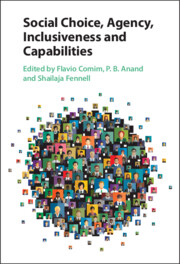Book contents
- Social Choice, Agency, Inclusiveness and Capabilities
- Social Choice, Agency, Inclusiveness and Capabilities
- Copyright page
- Contents
- Figures
- Tables
- Contributors
- Preface and Acknowledgements
- 1 Introduction: social choice, agency, inclusiveness and capabilities
- Part I Social Choice and Capabilities
- Part II Inclusiveness, Social and Individual Agency
- 7 In defence of inclusiveness
- 8 Exploring Sen on self-interest and commitment
- 9 Incorporating an emotional dimension in the capability approach
- 10 Sufficiency re-examined
- 11 Adaptive preferences versus internalization in deprivation
- 12 Enriching agency in the capability approach through social theory contributions
- 13 Creativity and capabilities
- Part III Social Choice and Capabilities in Action
- Index
- References
7 - In defence of inclusiveness
On sustainable human development, capability and indicators of progress*
from Part II - Inclusiveness, Social and Individual Agency
Published online by Cambridge University Press: 28 March 2024
- Social Choice, Agency, Inclusiveness and Capabilities
- Social Choice, Agency, Inclusiveness and Capabilities
- Copyright page
- Contents
- Figures
- Tables
- Contributors
- Preface and Acknowledgements
- 1 Introduction: social choice, agency, inclusiveness and capabilities
- Part I Social Choice and Capabilities
- Part II Inclusiveness, Social and Individual Agency
- 7 In defence of inclusiveness
- 8 Exploring Sen on self-interest and commitment
- 9 Incorporating an emotional dimension in the capability approach
- 10 Sufficiency re-examined
- 11 Adaptive preferences versus internalization in deprivation
- 12 Enriching agency in the capability approach through social theory contributions
- 13 Creativity and capabilities
- Part III Social Choice and Capabilities in Action
- Index
- References
Summary
Mahbub ul Haq’s sustainable human development (SHD) paradigm and Amartya Sen’s capability approach (CA) are both inclusive views inasmuch as they are articulated in such a way as to be compatible with certain other views. The CA is one of a range of perspectives compatible with the SHD. There is a tension between an ‘exclusive’ reading of the CA (which suggests that capability and functioning should be the only objects of informational focus) and the inclusion of ‘income’ as a ‘choice’ in the SHD. Attempts have been made to defuse the tension and to merge the two views into one ‘human development and capability approach’. There are risks that, in such a merger, (a) the SHD becomes associated with a specific perspective that is, arguably, hard to ‘operationalize’ and (b) the SHD can no longer ground coalitions, or consensus about indicators of progress across views as diverse as the CA and utilitarian perspectives focusing on the quality of human lives. While ‘inclusive’ interpretations of the CA can minimize the first risk, the capacity to ground coalitions and consensus is central to the inclusiveness of Haq’s SHD and to his legacy, and this chapter argue in its defence.
Keywords
- Type
- Chapter
- Information
- Social Choice, Agency, Inclusiveness and Capabilities , pp. 139 - 169Publisher: Cambridge University PressPrint publication year: 2024



